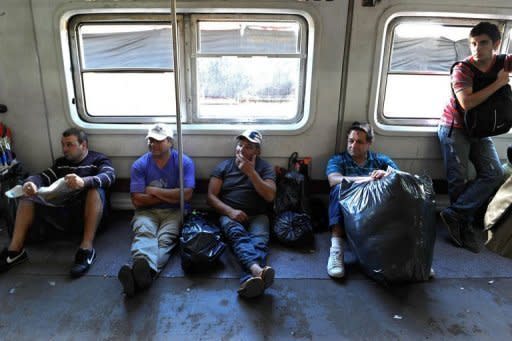Argentines seek answers after deadly train crash
Argentine families demanded answers after 50 people were killed and more than 700 injured when a packed commuter train plowed into a Buenos Aires rail terminus at rush hour. The train, carrying around 2,000 passengers, slammed into a wall at a major railway station early Wednesday, sending carriages crashing into each other and crushing the passengers inside. Inspector General Leandro Despouy, who oversees the functioning of the state railways, called for authorities to cancel the concession to the private company, Trenes de Buenos Aires S.A. (TBA), which operated the train. Despouy, who audited the same suburban train line in 2008, said the accident was caused by a "lack of respect for the most basic rules." Back in 2008 "the situation was disastrous and the braking system was terrible," said Despouy. State authorities have "not taken measures since then, nor applied serious sanctions" against the company. The head of TBA's technical department, Roque Cirigliano, rejected the accusations as he spoke to reporters at the scene of the accident. An angry crowd shouted "Murderers, murderers!" as he spoke. In a statement, TBA said it did not know the cause of the crash and that it would assist in the investigation. Planning Minister Julio de Vido told reporters Thursday that the government would sue the company. Marcos Cordoba, the train's 28 year-old conductor, was pried out of the wreckage and is recovering in a private clinic under heavy police protection. No charges have been filed against him, officials said. Blood tests show that Cordoba had not been drinking, and Transportation Secretary Juan Pablo Schiavi said that he had an excellent work record. The union leader representing workers on the Sarmiento line said he feared that the low-level workers would be used as scapegoats for the accident, and called for top company officials to be investigated. At the morgue, victims' families desperately searched for the missing, joined by teams of psychologists from the health ministry. One woman, Silvino Zelaya, showed a photograph of her 37-year-old sister Maria Teresa. "She traveled in the first carriage to leave the platform as quickly as possible and we can't find her anywhere," he said. Most bodies were found in the first and second carriages. "My son must be somewhere, alive or dead!" cried Maria Lujan, mother to 20-year-old Lucas Menghini. The head of the city's emergency services, Alberto Crescenti, said on local radio that there were 703 wounded, according to the latest hospital counts. The death toll reached 50, with 11 still unidentified, authorities said. Meanwhile passengers returned to the station, with less people occupying the front carriages of trains. "It's more silent. People seem shocked. I didn't sleep last night," said a 19-year-old who gave his name as Daniel. The Secretary General of the Organization of American States (OAS), Jose Miguel Insulza, said Thursday he was "deeply dismayed by the tragic accident" which "all Latin Americans" are mourning, as condolences poured in from around the world. Five Paraguayans and a Chilean national were among the dead, while four Paraguayans were injured, officials in Santiago and Asuncion said. The Sarmiento rail line, owned by TBA, links the center of Buenos Aires to a densely populated suburb 70 kilometers (44 miles) to the west of the city. It uses rolling stock made in Japan and acquired in the 1960s. The rail network was privatized in the 1990s. The toll from Wednesday's crash far surpassed that seen in the city's last major rail disaster just five months ago, when two trains and a bus collided during rush hour, killing 11 people and injuring more than 200. The region's transit system has been plagued with serious accidents in recent years. Argentina's deadliest train tragedy was in 1970, an accident that killed 236 people in northern Buenos Aires.



